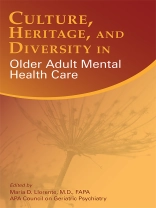Health care organizations are beginning to recognize the importance of cultural competence as it relates to efficiency, quality, and equity in the delivery of care within a competitive health care market, and Culture, Heritage, and Diversity in Older Adult Mental Health Care is designed to train mental health clinicians to deliver culturally sensitive care to an increasingly diverse patient population. Projections indicate that 35% of patients older than age 65 will be from a racial or ethnic minority group by 2050, compared with 11% in 1970. Today’s mental health practitioners require knowledge, sensitivity, and an understanding of institutionalized practices and systems that undermine their patients’ health and well-being.
The term culture is multifaceted and may refer to one’s belief system, values, religion, race, socioeconomic status, ethnicity, language, sexual orientation, geographic location, educational level, age, occupational risks and exposures, and gender. The authors of the book examine mental health care through these lenses, teaching the reader about implicit biases and potential miscommunication and offering strategies for overcoming these difficulties. The editor, who has worked in leadership positions overseeing veterans’ mental health services, has assembled an impressive and diverse roster of contributors, each with specific expertise in his or her assigned subject. The ways in which cultural competency interacts with the six Accreditation Council for Graduate Medical Education core competencies are explored in detail. For example, in terms of patient care, cultural competency plays an important role in gathering subjective data about a patient that may ultimately impact outcomes. Teaching methods to increase cultural sensitivity and build skills in this area are highlighted, as are training modalities and clinician evaluation. The effects of migration and acculturation on mental health are examined, providing clinicians with several theoretical frameworks for understanding the migratory experience in older adults and exploring psychosocial factors associated with psychological risk in aging immigrants. Linguistic competence, defined broadly as effective communication with individuals speaking a nondominant language, is an essential component of culturally competent health care and is of particular importance in mental health care. Accordingly, the authors analyze linguistic competency in both administrative and clinical encounters and present strategies for achieving mastery in this critically important area. The text provides an abundance of tables and pedagogical features designed to enhance comprehension, including learning objectives, key points, and study questions.
Cultural competence in health care systems is defined as the ability to understand and integrate the features listed above into the provision of health care services. Culture, Heritage, and Diversity in Older Adult Mental Health Care prepares clinicians to provide sensitive, high-quality, culturally competent care to geriatric patients from diverse backgrounds and will prove indispensable as patient demographics continue to change.
Table of Content
Contributors Foreword Preface Chapter 1. Why Is Cultural Competency Important When Working With Older Adults?Chapter 2. Cultural Competence in Geriatric Psychiatry Teaching and Evaluative Methods Chapter 3. Migration, Acculturation, and Mental Health Chapter 4. Asian Americans and Pacific Islanders Chapter 5. Culturally Competent Care for Geriatric Indigenous Peoples American Indians, Alaska Natives, First Nations, and Native Hawaiians Chapter 6. African American Older Adults Chapter 7. Cultural Competency and Latino Elders Chapter 8. Older Lesbian, Gay, Bisexual, and Transgender Adults Chapter 9. Rural Elderly Chapter 10. The Seventh Age Centenarians Chapter 11. Cultural Competency and Veterans Answer Guide Index
About the author
Maria Llorente, M.D., FAPA, is Deputy Chief of Staff, Washington DC VA Medical Center, Department of Veterans Affairs, and Professor of Psychiatry at Georgetown University School of Medicine in Washington, D.C.�












